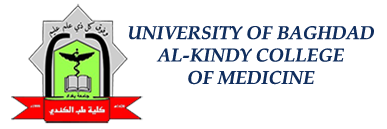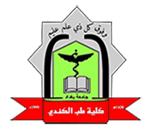History and Profile
The department of family & community medicine in Al Kindy College of Medicine was established in 1998. The department teaches undergraduate medical students. It constitutes of five modules, Introduction to health and disease, measurement of health (Biostatistics and Epidemiology).Preventive Medicine Module: (Evidence Based medicine, control of Communicable Diseases, Social & Environ Healthcare, Occupational Healthcare, Medical Ethics) , Research module and Primary Healthcare module.
Vision
Family & Community Medicine department acts to make the student in Al-Kindy College of Medicine able to recognize and apply the scientific value and the basic rules of family and community medicine, and to integrate medical education with scientific research to provide comprehensive health care to solve health problems in Iraqi society.
Mission
The department’s mission is to educate medical students to work in today’s dynamic healthcare environment and to provide excellence academic knowledge and research training for the student in Al-Kindy College of Medicine to be able to imagine the importance of the health for individual, family and community with an emphasis on most common health problems in our community for better accommodation and application of preventive programs. While in the post graduate studies, the department aims to create medical professionals in medical education able to withstand the difficulties of medical teaching in Iraqi medical institutions.
Future Vision
Achieve excellence locally and regionally in the field of community and family medicine through progression in scientific teaching, innovative research and medical education to meet the needs of the community.
Objectives
The broad objective of this department is to provide high quality training in community medicine to the medical students enrolled for M.B.Ch.B. (basic medical degree (in Al-Kindy College of Medicine to be able to determine the current health situation of the Iraqi society and to identify health priorities. This is done by providing the medical students with:
- Relevant competencies and skills in epidemiology and statistics in analysis of health indicators.
- The ability to use preventive and control measures to control main health problems in the community.
- Basic principles in conducting and evaluation of scientific researches.
- Basic understanding of primary health care & family medicine as strategy and services.
- Basic understanding of management skills in health programs.
- Better understanding in the field of communicable disease controls, mode of transmission, incubation period, susceptibility, and how can we control and prevent it, especially endemic diseases in Iraq.
- Better understanding of non-communicable diseases as important emerging global impact, their risk factors, susceptible persons and methods of prevention.
- Better understanding for the concept of occupational and environmental health, and the role of safe environment in health promotion.
Introduction to Health & Disease Module:
It extend for 15 weeks, One lecture per week in semester 2 for first year: to provide a broad scope for the students to understand the history and evolution of medicine, essential medical terms and definition and classification pf health status and disease.
Measurements of Health Module:
It extend for 15 weeks, one lecture per week in semester I for second year.
To provide a broad scope for the students to understand the concept of Biostatistics and epidemiology in measuring of health and disease in human populations and conducting medical research for health promotion, disease prevention and provision of best healthcare.
Preventive Medicine Module:
It extends into five weeks for third year: to provide a comprehensive approach for the students to understand the concept of preventive medicine and evidence based medicine. This will allow the students to understand the concepts of community health, describe the determinants of health, common communicable diseases & their control measures, and appreciate the role of Preventive Medicine in healthcare settings.
Research Module:
To fulfill the study requirement in the department, a field research must be done by the students in the third stage and under the supervision of member of all departments of the college. 120 hours Students can analyze their project
The topics of these researches cover the variety of health problems in our community such as:
- The study of common and newly observed health problems.
- Identify risk factors.
- Evaluation of health services, study of knowledge and practice of part of segments of society to the problem of health.
- Students learn during the research phase, the scientific method in research conduction taking into account medical ethics.
Primary Healthcare Module:
To provide a comprehensive approach for the students to understand the concept of essential health care” that is based on scientifically sound and socially acceptable methods and technology. This makes universal health care accessible to all individuals and families in a community. PHC initiatives allow for the full participation of community members in implementation and decision making.
Theory: 60 lectures + Practical: PHC center: 30 hours
Post Graduate study
Family and Community medicine department also provides:
Higher Diploma in family medicine for two years
Professional Diploma in family medicine for one year
Diploma in medical education which is stopped at 2014, which is the first post graduate study of such specialty in Iraq, with ambition to prepare a professional medical educators that able to deliver medical information in a scientific and appropriate methods and technique to medical students.
The members of the department as the other teaching staff in the college who start to participate in the e learning through using the moodle and google suit for education even before the COVID -19 era which enable them to switch to the e- learning after the lockdown after the epidemic of COVID 19 by sharing the theoretical and practical material using the PDF, power point and videos files with students and interactive lectures using Zoom and google Meet.
| Name | Academic Degree | CV | Specialty | Title |
|---|---|---|---|---|
| Mohammed Asaad Ibrahim Mohammed Al-Bayati | Iraqi Board | CV | Community Medicine | Professor |
| Lujin Anwar Aboud Kazim Al-Khazarji | Iraqi Board | CV | Family Medicine | Professor |
| Huda Adnan Habib Hamidi Al-Mhana | Iraqi Board | CV | Family Medicine | Professor |
| Wadjan Akram Hussein Ali Al-Sabiti | Iraqi Board | CV | Community Medicine | Professor |
| Aseel Samir Mohammed Mahmoud Al-Amari | PhD | CV | Statistics/Applied Statistics | Lecturer |
| Ghaydaa Rifaat Hamid Mahdi | Iraqi Board | CV | Community Medicine | Lecturer |
| Haidar Rahim Hamoud Hassan Al-Saadi | PhD | CV | Civil Engineering/Transportation | Lecturer |
| Mustafa Sabih Aboud Al-Sudani | PhD | CV | Mechanical Engineering Sciences/Fluids and Heat | Lecturer |
| Israa Salim Kaat Sabah Al-Ruhaiwi | PhD | CV | Economics/Philosophy in Economics | Lecturer |
| Mohammed Moad Abbas | Master's | CV | Computer Enginering | assistant lecturer |

